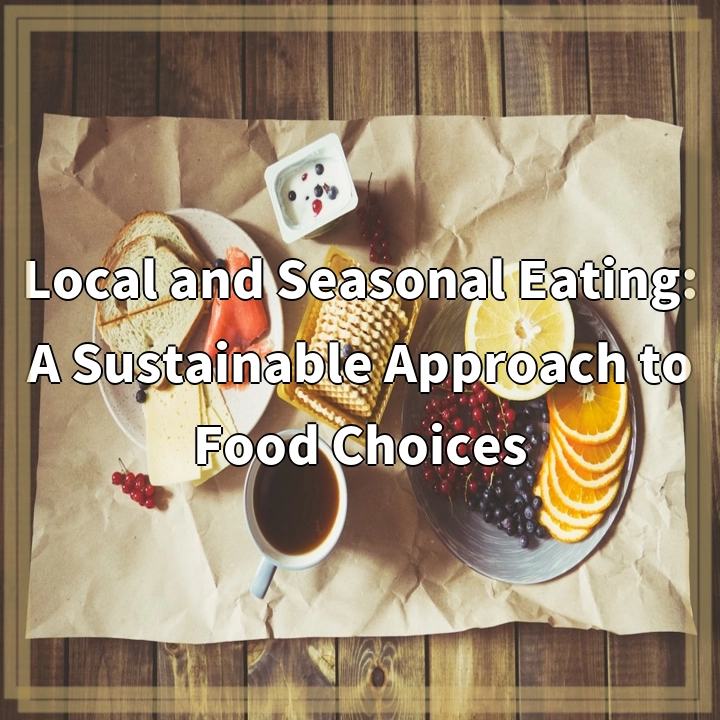
What it is:
Local and seasonal eating refers to the practice of consuming food that is produced within a specific geographical area and is in season at the time. This sustainable approach to food choices promotes the idea of sourcing ingredients from local farms, gardens, and markets, which not only supports the local economy but also reduces the carbon footprint associated with food transportation.
Eating seasonally means selecting fruits, vegetables, and other products that are naturally ripe during specific times of the year. This method encourages individuals to be more in tune with the earth’s cycles, leading to greater appreciation for the food they consume and its impact on the environment.
Real-world problems
Despite the numerous benefits of local and seasonal eating, there are still several challenges that individuals may face when trying to adopt this lifestyle.
Accessibility and Availability
One of the primary barriers to local and seasonal eating is the accessibility of fresh produce. Many urban areas lack farmers’ markets or local stores that offer seasonal items. Moreover, some regions experience limited growing seasons due to climate conditions, making it difficult for residents to find a variety of local foods year-round.
Price Variability
Local and seasonal products can sometimes be more expensive than their mass-produced counterparts. Larger grocery chains often benefit from economies of scale, allowing them to sell goods at lower prices. Consequently, consumers may hesitate to buy local, particularly if they are on a budget.
Awareness and Education
Many people are simply unaware of the benefits of local and seasonal eating. Education plays a crucial role in changing perceptions and habits related to food consumption. Without adequate knowledge about what is seasonal in their area or the advantages of supporting local agriculture, individuals may find it challenging to make informed choices.
Food Waste
Seasonal eating can lead to food waste if individuals buy more produce than they can consume within its shelf life. If people are not accustomed to cooking with seasonal ingredients, they might struggle to utilize them fully, resulting in spoiled food that ends up in landfills.
Supply Chain Limitations
While supporting local farms is beneficial, the localized supply chain can sometimes lead to issues such as production shortages or fluctuations in availability. During adverse weather conditions, farmers may face crop failures that can limit the availability of certain seasonal items, making it difficult for consumers to rely solely on local sources.
Addressing these real-world problems requires a concerted effort from individuals, communities, and policymakers to create systems that promote and support local and seasonal eating. By enhancing access, affordability, education, and storage solutions, we can work towards a more sustainable and conscious food system.

Solutions for Enhancing Local and Seasonal Eating
To overcome the challenges associated with local and seasonal eating, various solutions can be implemented to promote access, education, and sustainable practices.
Improving Accessibility
Creating more farmers’ markets and local food co-ops can significantly enhance accessibility to fresh, seasonal produce. Local governments and community organizations can collaborate to establish these markets in urban areas, making it easier for residents to obtain local foods.
Promoting Affordability
Encouraging the development of community-supported agriculture (CSA) programs can help bridge the gap in pricing. By allowing consumers to buy shares of seasonal produce directly from local farms, costs can be lowered while providing farmers with upfront revenue to sustain their operations.
Enhancing Awareness and Education
Developing educational campaigns that highlight the benefits of local and seasonal eating can foster greater awareness. Workshops, online resources, and school programs can teach communities about seasonal foods, nutritional benefits, and cooking techniques, empowering individuals to make informed choices.
Minimizing Food Waste
Encouraging meal planning and creative cooking can help minimize food waste associated with seasonal produce. Sharing recipes that utilize various seasonal ingredients can inspire individuals to make the most of their purchases, thus reducing spoilage.
Strengthening Supply Chains
Developing stronger relationships between local farmers and consumers can help ensure a stable supply of seasonal foods. By improving distribution channels and communication about what is available locally, consumers can adapt their purchasing habits based on the seasonal offerings.
These solutions, when implemented collectively, can significantly bolster local and seasonal eating, thereby contributing to a more sustainable and resilient food system that benefits both individuals and the environment.















